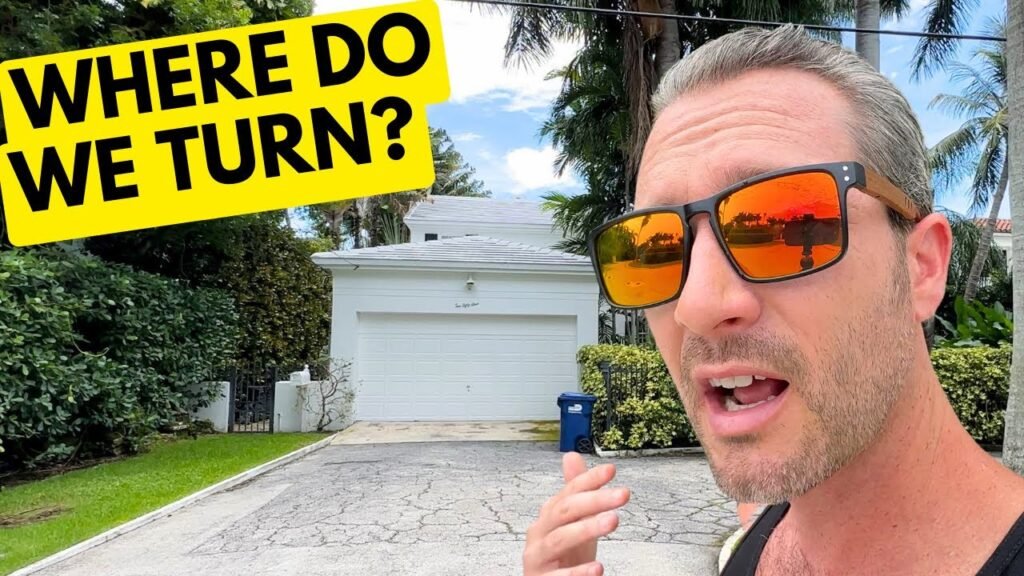You’re Being DROPPED! Insurance NON-RENEWAL Notice – What Now?
Hey there! Just wanted to chat with you about something pretty important. Have you heard about all the homeowners insurance policy holders who are getting dropped or seeing huge increases in their premiums? It seems like it’s happening for no reason other than where they live. Now, if you happen to receive a non-renewal letter from your insurance carrier, don’t panic! I’ve got some tips and advice for you on what steps to take next to navigate this challenging situation.
So, what can you do if you find yourself facing one of these non-renewal notices? Well, I’m here to help guide you through the process. From offering 1 on 1 calls to sharing insights on how to make your home more insurable, I’ve got your back. Make sure to reach out to your insurance agent, explore potential solutions or upgrades for your home, and be cautious of unfamiliar insurance companies. Remember, you’re not alone in this, and there are options available to help you navigate through this unexpected situation.

Understanding Insurance Non-Renewal
Reasons for non-renewal notices from insurance carriers
Insurance carriers issue non-renewal notices to policyholders for various reasons, commonly due to increased risks associated with the location of the insured property. Factors such as high incidence of claims, natural disasters, or changes in the underwriting guidelines of the insurance company can lead to non-renewal. Non-renewal may also occur if the policyholder fails to meet the insurer’s eligibility requirements, such as maintaining necessary safety features in the home.
Impact of non-renewal on homeowners
Receiving a non-renewal notice from an insurance carrier can be unsettling for homeowners. The sudden loss of coverage can leave them vulnerable to financial risks associated with property damage, liability claims, or other unforeseen circumstances. Homeowners may struggle to find alternative insurance options, especially in high-risk areas where insurance carriers are reluctant to offer coverage. Non-renewal can disrupt homeowners’ financial planning and place an additional burden on their budget.
Options for homeowners facing non-renewal
Homeowners facing non-renewal notices should explore their options to secure alternative insurance coverage. One proactive step is to contact insurance agents or brokers to discuss potential solutions, upgrades to the property, or alternative insurance carriers. Homeowners can also consider making their homes more insurable by implementing safety measures or enhancements recommended by insurance experts. It is crucial for homeowners to act promptly upon receiving a non-renewal notice to avoid gaps in coverage and protect their assets.
Guidance from Michael Bordenaro
Bordenaro’s advice on dealing with non-renewal notices
Insurance expert Michael Bordenaro provides valuable insights and advice on how homeowners can navigate non-renewal notices from insurance carriers. Bordenaro emphasizes the importance of understanding the reasons behind non-renewal and taking proactive steps to address the underlying issues. By seeking guidance from professionals like Bordenaro, homeowners can better prepare for the challenges associated with insurance non-renewals.
Benefits of 1 on 1 calls with Bordenaro
Michael Bordenaro offers personalized 1 on 1 calls to assist homeowners facing insurance non-renewal issues. These consultations provide homeowners with tailored advice, strategies, and solutions to address their specific insurance challenges. By engaging in direct communication with Bordenaro, homeowners can gain clarity on the complex insurance landscape and make informed decisions to protect their property and investments.
Insight into Bordenaro’s expertise on insurance issues
As a trusted resource in the insurance industry, Michael Bordenaro brings a wealth of knowledge and experience to help homeowners understand insurance policies, regulations, and best practices. Bordenaro’s expertise extends to various aspects of insurance, including non-renewal processes, risk assessment, and mitigation strategies. By leveraging Bordenaro’s insights, homeowners can navigate insurance non-renewals with confidence and pursue effective solutions to safeguard their homes.
Homeowners in High-Risk Areas
Impact of living in high-risk areas on insurance
Homeowners residing in high-risk areas, such as Florida, California, and Louisiana, face unique challenges related to insurance coverage. The elevated risks of natural disasters, environmental hazards, or high crime rates in these regions make it difficult for insurance carriers to offer affordable policies. Homeowners in high-risk areas are more likely to receive non-renewal notices due to the increased likelihood of claims and losses.
Trends in non-renewal notices in Florida, California, and Louisiana
Recent trends indicate a rise in non-renewal notices issued to homeowners in Florida, California, and Louisiana. These states experience frequent natural disasters, including hurricanes, wildfires, and floods, which pose significant risks to properties and insurers. The escalating costs of insurance claims and the challenges of underwriting policies in high-risk areas contribute to the increase in non-renewal notices for homeowners.
Steps to mitigate risks and make homes more insurable
To address the challenges of living in high-risk areas, homeowners can take proactive measures to mitigate risks and enhance the insurability of their properties. Installing fire alarm systems, security systems, and smart technology can improve safety and reduce the likelihood of claims. Clearing vegetation, reinforcing structures, and implementing disaster-resistant features can make homes more resilient to environmental hazards. By investing in risk reduction strategies, homeowners can increase their chances of securing insurance coverage and protecting their homes from potential disasters.
Insurance Costs and Expenses for Homeowners
National average for homeowners insurance
The national average cost of homeowners insurance based on a $250,000 dwelling is $1428 annually, according to industry data. However, insurance costs vary significantly across states and regions based on factors such as climate, risk exposure, and regulatory environment. Homeowners in high-risk areas often face higher insurance premiums due to the elevated risks associated with living in those locations.
Comparison of insurance costs in different states
Insurance costs can vary widely among states, with some regions experiencing significantly higher premiums than the national average. States like Florida, where the annual average insurance cost is $6000, have some of the highest insurance rates in the country. Factors such as frequency of natural disasters, claims history, and cost of living contribute to the differences in insurance costs between states.
Factors contributing to high insurance costs
Several factors influence the high insurance costs for homeowners, including rising property values, construction costs, and claims frequency. Insurance carriers adjust premiums based on the risk exposure of properties, historical data on losses, and market conditions. Additionally, regulatory changes, economic trends, and insurance fraud can impact insurance costs and expenses for homeowners.

Protecting Your Home and Investments
Tips for making homes more insurable
Homeowners can take proactive steps to make their homes more insurable and reduce the likelihood of non-renewal notices from insurance carriers. Implementing safety measures such as smoke detectors, carbon monoxide alarms, and burglar alarms can enhance the security of the property. Regular maintenance, repairs, and upgrades to electrical, plumbing, and HVAC systems can help prevent losses and damage. By investing in home protection measures, homeowners can improve the insurability of their properties and lower insurance risks.
Importance of proactive measures in reducing risks
Taking proactive measures to protect homes and investments is essential for homeowners to mitigate risks and ensure financial security. By conducting regular assessments of property vulnerabilities, addressing safety hazards, and reinforcing structural integrity, homeowners can prevent potential disasters and insurance claims. Proactively managing risks and implementing preventive measures can help homeowners safeguard their assets and reduce the likelihood of insurance non-renewals.
Impact of insurance costs on homeowners’ investments
Insurance costs play a significant role in homeowners’ investments by affecting property values, affordability, and maintenance expenses. Rising insurance costs can impact homeowners’ budgets, cash flow, and overall financial stability. High insurance premiums may deter prospective buyers, limit property appreciation, or increase the total cost of homeownership. By managing insurance costs effectively and protecting their investments, homeowners can preserve the value of their properties and secure long-term financial benefits.
Dealing with Non-Renewal Notices
Steps to take upon receiving a non-renewal notice
Upon receiving a non-renewal notice from an insurance carrier, homeowners should take immediate action to address the situation and secure alternative coverage. Contacting the insurance agent or broker listed on the notice is the first step to understand the reasons for non-renewal and explore potential solutions. Homeowners should review their current policy, assess their insurance needs, and gather relevant information to facilitate discussions with insurance professionals.
Consulting with insurance agents for solutions
Consulting with insurance agents or brokers is essential for homeowners facing non-renewal notices to explore alternative insurance options and find suitable coverage. Insurance professionals can assess the property, evaluate risks, and recommend preventive measures to enhance insurability. By collaborating with insurance agents, homeowners can navigate the complexities of insurance non-renewals, negotiate terms, and secure adequate protection for their homes.
Warning signs of potential insurance scams
Homeowners should be cautious of lesser-known insurance companies or fraudulent schemes that exploit individuals seeking insurance coverage. Scammers may offer seemingly legitimate policies at attractive rates but fail to deliver adequate coverage or service. Warning signs of insurance scams include unsolicited offers, unverifiable credentials, and requests for upfront payments or personal information. To protect themselves from potential fraud, homeowners should verify the legitimacy of insurance providers, review policy terms thoroughly, and consult trusted insurance professionals.

Challenges for Developers and Property Owners
Issues faced by developers due to rising insurance costs
Developers and property owners are grappling with escalating insurance costs, which pose challenges to new construction projects, property investments, and real estate developments. The rising premiums and deductibles for insurance coverage increase the overall expenses and impact the profitability of development projects. Developers must factor in insurance costs, risk management strategies, and regulatory compliance when planning construction activities.
Impact of insurance costs on property selection and construction timelines
The soaring insurance costs per unit create financial constraints and uncertainties for developers selecting properties, securing financing, and completing construction projects. Insurance expenses significantly impact construction timelines, budgeting, and profitability margins, leading to delays, cost overruns, and project cancellations. The volatility in insurance rates and availability influences property selection decisions, design choices, and investment strategies for developers and property owners.
Factors contributing to the uncertainty in the housing market
The uncertainty in the housing market stems from various factors, including rising insurance costs, economic conditions, regulatory changes, and supply chain disruptions. Developers and property owners are facing challenges related to insurance non-renewals, increased claims exposure, and limited insurance options. The volatile insurance market, combined with evolving risks and environmental factors, adds complexity to property development, investment decisions, and market trends.
Understanding Insurance Fraud
Role of insurance fraud in escalating insurance costs
Insurance fraud contributes to the escalation of insurance costs by inflating claims, increasing administrative expenses, and eroding the financial stability of insurance companies. Fraudulent activities, such as false claims, staged accidents, or misrepresentation of information, create additional risks and liabilities for insurers. The prevalence of insurance fraud undermines the integrity of the insurance industry and necessitates stricter measures to combat fraudulent practices.
Warning signs of insurance fraud schemes
Homeowners and policyholders should be vigilant of warning signs indicating potential insurance fraud schemes or scams. Common red flags include unsolicited offers, aggressive sales tactics, promises of unrealistic discounts, or requests for personal or financial information. Policyholders should verify the credentials, licenses, and reputation of insurance providers before entering into any agreements. Seeking guidance from trusted insurance professionals can help homeowners identify and avoid fraudulent schemes that jeopardize their financial security.
Impact of insurance fraud on legitimate homeowners and businesses
Insurance fraud not only affects insurance companies but also impacts legitimate homeowners and businesses by driving up premiums, lowering coverage limits, and creating distrust in the insurance market. Fraudulent activities lead to higher costs, reduced benefits, and increased regulatory scrutiny for policyholders. The consequences of insurance fraud extend beyond financial losses to reputational damage, legal liabilities, and compliance risks for individuals and organizations. Preventing insurance fraud is essential to protect consumers, maintain industry standards, and preserve the integrity of insurance services.

Economic Impact on Homeownership
Implications of rising insurance costs on homeowners
The implications of rising insurance costs on homeowners include increased expenses, reduced affordability, and financial uncertainty in managing property-related risks. Higher insurance premiums, deductibles, and claims settlement costs create additional financial burdens for homeowners, affecting their overall budgeting and planning. The inability to secure affordable insurance coverage may result in gaps in protection, inadequate coverage, or limited access to essential services for homeowners.
Comparison of expenses for homeowners vs. renters
Homeownership expenses, including property taxes, maintenance costs, insurance premiums, and unexpected repairs, can exceed the financial commitments of renters. Homeowners bear the responsibility for property-related expenses, utility bills, and property management tasks, which can strain their budgets and cash flow. Renters, on the other hand, benefit from fixed rental payments, flexibility in housing choices, and reduced liabilities associated with property ownership. The comparative costs of homeownership versus renting highlight the financial implications of insurance costs on housing decisions and lifestyle choices.
Effects of inflation rates on homeowners’ budgets
Inflation rates play a significant role in homeowners’ budgets by influencing the costs of goods, services, and housing-related expenses. Rising inflation can impact homeowners’ purchasing power, savings, and debt obligations, leading to increased financial pressures and budget constraints. Fluctuations in interest rates, consumer prices, and wage growth influence homeowners’ ability to afford mortgage payments, insurance premiums, and property taxes. Managing inflation risks, anticipating cost increases, and adjusting financial plans are essential for homeowners to maintain financial stability and navigate economic challenges.
Conclusion
Summarizing key takeaways on insurance non-renewal
Understanding insurance non-renewal is essential for homeowners to prepare for unexpected changes in coverage, mitigate risks, and protect their properties. Non-renewal notices from insurance carriers can disrupt homeowners’ financial planning, increase insurance costs, and create uncertainty in property ownership. By exploring alternative insurance options, consulting with insurance experts, and implementing risk management strategies, homeowners can address challenges associated with non-renewal and secure adequate coverage for their homes.
Actionable steps for homeowners facing insurance challenges
Homeowners facing insurance challenges, such as non-renewal notices, escalating costs, or coverage limitations, can take proactive steps to safeguard their homes and investments. By conducting risk assessments, enhancing property security, and reviewing insurance policies, homeowners can mitigate risks, reduce insurance costs, and ensure adequate protection for their assets. Seeking guidance from insurance professionals, staying informed about industry trends, and exploring innovative solutions are key actions for homeowners to navigate insurance challenges effectively.
Future outlook on insurance trends and challenges
The future outlook on insurance trends and challenges points toward continued volatility, regulatory changes, and market uncertainties affecting homeowners and insurers. The evolving risks associated with climate change, natural disasters, and technological advancements will shape the insurance landscape and influence coverage options for policyholders. Anticipating emerging trends, adapting to regulatory requirements, and investing in risk mitigation measures are essential for homeowners to manage insurance risks, protect their investments, and secure long-term financial stability in the dynamic insurance market.


